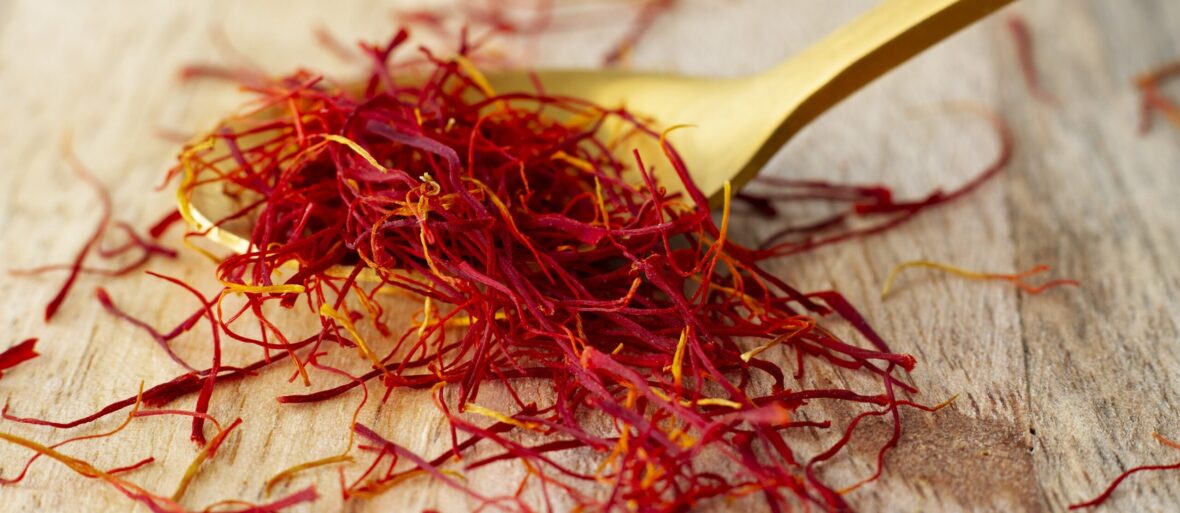Saffron uses for multiple health benefits, which is also known as Zaffran or Kesar. It is one of the most expensive spices in the world when compared to the other spices. Saffron is a spice herb that is harvested from the flower of a certain type of plant called the “Crocus sativa”. It has been used as a spice for centuries as a flavouring, color, and seasoning. It has also been used as a medicine. The main commercial producers of saffron are Iran, Greece, Morocco, Spain, India, and Italy.
This article review the top 10 saffron uses for health benefits, how it is uses, and side effects and risk.
Why is saffron so expensive?
The main reason is that saffron costs a lot of money to harvest. Compounds Vitamins, like Vitamin A, Vitamin C, Vitamin B12, Roflavin, Folate, Potassium, Iron, Magnesium, Phosphorus, Sodium, Zinc, Thiam.

Top 10 Saffron uses for health benefits:
As stated above, Saffron is very useful to our health in many ways, & its numerous health benefits are discussed below:
1. Antioxidants:
Saffron has been found to be a source of antioxidants, which can help protect the body from the harmful effects of free radicals. These free radicals have been linked to a variety of chronic diseases, including cancer. A study conducted on patients with coronary heart disease demonstrated that daily saffron consumption for a period of six weeks can provide protection against oxidative stress. Additionally, its antioxidant properties can help to delay the onset of aging and mental decline, as well as protect against the sun’s damaging rays that can cause skin cancer.
Saffron can also be used to promote the health of the blood vessels and arteries, as well as to prevent blockages. Furthermore, recent studies have indicated that saffron can improve concentration, memory, and brain cell health, as well as provide relief from hair problems, such as dry hair and hair loss. Additionally, it may be beneficial in the treatment of seasonal illnesses, such as colds, coughs, and fevers.
2. Relieve anxiety, stress & depression:
Saffron have alfa-crocin and safranal compound in it, & it helps to relieve mild to moderate depression and improve mood in those who regularly consume. A study have shown that Saffron is rich in carotenoid, which can improve the immune system, and also reduce stress levels. It also contains many active compounds that have some effect on the endcrine system, which can stimulate the release of beneficial hormones that keep us happy and healthy.
3. Good for heart health:
Many studies found that daily intake of saffron improves the overall health of our hearts, and also reduces many risk factors often associated with heart disease by strengthening the circulatory system, and boost heart health. These studies also shown that Saffron helps in reducing the risk of heart attack, and it increases the heart’s pumping capacity & improving heart function. It is rich in thiamin and riboflavin, that promotes a healthy heart and helps prevent various cardiac issues.

4. Manages diabetes & blood pressure:
Saffron can help with diabetes, and it’s a great source of cinnamaldehyde and saffron that kickstart the antidiabetic response since they have an insulin-sensing effect. A recent study also found that saffron can help stop too much glucose from building up in the blood. If you eat saffron regularly in the right amounts, it can help keep your blood pressure in check. It can also help with hyperglycemia and oxidative stress, as well as manage the common symptoms of diabetes, and can even help with diabetes-related dementia.
5. Reduces cancer risks:
Numerous research, studies and organizations found that it may reduce cancer risk. It contains two major carotenoids, which is known as crocin, and crocetin, and they have powerful antitumor effects that inhibit the growth of tumors, and it also acts as an immune modulator and guards the body from cancer. It also slow down the growth of skin, bone marrow, lung, breast, cervix and prostate cancer.
6. Saffron benefits for female:
Recent studies have demonstrated that saffron benefits for female who consumed saffron for a period of six months experienced a decrease in their Premenstrual syndrome (PMS) symptoms. Exposure to saffron scent for a period of twenty minutes has been found to significantly reduce PMS systems and regulate the menstrual cycle in female. This is believed to be due to the decrease in cortisol, a major stress hormone, which is responsible for the onset of PMS symptoms.
Additionally, saffron has been found to be effective in treating PMS symptoms in female aged 20–45, with 30mg of saffron taken daily being more effective than placebo. Furthermore, a study found that simply inhaling saffron for twenty minutes had a positive effect on PMS symptoms such as anxiety and lowered cortisol levels.
7. May reduce appetite and aid weight loss:
Snacking is a habit that can lead to weight gain. Studies show that saffron can help you avoid overeating by lowering your appetite. In a study, women taking saffron pills reported feeling fuller, less likely to snack, and losing significantly more weight than those taking a placebo. In another study, saffron extract was found to dramatically reduce hunger, BMS, waist circumference and total fat mass when taken as a supplement. Scientists don’t know how saffron can reduce hunger and promote weight loss.
One theory is that saffron boosts your mood, which makes it less likely you’ll want to eat. Saffron may help prevent snacks by reducing hunger, which promotes good weight management. Saffron works wonders well to reduce both TBS and waist circumference.

8. Preventing nervous system disorders:
It looks like saffron might have some kind of antioxidant properties that could help protect us from neurological issues. In 2015, a study was published in the Journal of Antioxidants that said compounds in saffron, like crocin, could help reduce inflammation and oxidative damage in the brain. Plus, a study in people with mild-to-moderate Alzheimer’s disease was done using saffron for 22 weeks and it showed that people who took saffron had similar cognitive improvements to those who took the same drug.
The study also found that saffron had fewer side effects than people who took donepezil. It’s still just a guess, but more research is needed to figure out if saffron has any medicinal benefits.
9. Supporting libido:
Saffron can also improve sexual appetite and sexual performance in both men and women. In a 2012 study, researchers looked at saffron benefits for male infertility problems. They found that saffron had a beneficial effect on ED and overall sexual performance, but did not alter the viability of sperm. In another 2012 study, researchers examined the effects of taking saffron and a placebo on women who had previously reported sexual dysfunction as a result of taking the anti-depressant. Women taking saffron 30 mg daily for 4 weeks experienced an increase in sexual appetite and vaginal lube compared to those taking a placebo.
10. Other health benefits:
- Anti-inflammatory – It has anti-inflammatory properties, which can improve cardiovascular health in all age of people.
- Improve eye-sight – Initial research have found that saffron is a best option for those who wish to slow down or eliminate vision loss due to natural process of aging.
- Useful for Parkinson’s and Alzheimer’s disease – Saffron is condensed and used in the treatment of Parkinson’s disease, and memory loss. It is also useful in treatment of Alzheimer’s disease.
- Good for immune system – Saffron’s antioxidant properties helps in boosting the immune system, and to elevate energy levels. Additionally, it is also able to improve blood circulation, and oxygen delivery to muscles when exercising.
- Skin benefits – It has several science backed skin benefits, like protect UV radiation, fights inflammation, reduce hyperpigmentation, and supports wound healing.
What are the best ways to consume saffron?
Saffron can be consumed in several ways, such as to add favorite’s dishes and prepare a drink.
- Saffron milk benefits – Add 2 – 3 strands of saffron in a cup of warm milk for about 5 minutes, add a pinch of cinnamon powder, mix well, and enjoy before going to bed.
- Plain tea – Add few saffron threads in hot water & drink, it is useful for weight-loss. People who takes saffron tea felt more full and snacked less often throughout the day.
- Precious drink – Add a pinch of saffron in boil water, add one cinnamon stick, one teaspoon of grated ginger, a few drops of lemon juice, add sugar or honey as per taste, let it simmer for 5 minutes, strain it and drink.
- Indian tea – Take 1 cup of water, add 10-12 saffron threads, ½ teaspoon of cardamom powder, 1 teaspoon of tealeaves & sugar, boil & then add 1 cup of milk, boil for a few minutes, strain it and enjoy.
Just 2-3 strands of saffron per day is enough. The recommended dose of saffron is safe up to 1.5 grams per day, but research suggested the benefits can be found with as little as 30 mg per day.

What are the potential uses of saffron during pregnancy?
Due to its ability to regulate mood and its anti-nausea effects, saffron is traditionally thought to have some potential uses during pregnancy, such as assisting with mood swings and morning sickness. Saffron is another spice that some cultures use in their cooking because they think it can give pregnant women the nutrients they need. However, it’s important for expectant women to speak with a medical professional before using saffron or any herbal remedies during pregnancy as the safety and dosage depend on the individual and should be carefully considered.
What are side effects and risks of using saffron?
Saffron is a great spice to add to your diet without risking too much. Eating just 1.5 grams a day is usually safe, but if you eat too much, it can be toxic. 5 g is considered a toxic dose, and very high dosages can be dangerous for some people. For example, a study said pregnant women shouldn’t eat more than 5 g of saffron a day because it can stimulate the uterus. If you have an allergic reaction after eating saffron, you should see a doctor right away.
Conclusion
It’s safe to say that saffron has a ton of advantages, and most studies have shown that Saffron uses for health benefits. It’s pricey, but it’s really effective if you take it in the right amount. If you’re taking it for a long time, it’s probably best to get a doctor’s advice. It’s an old and expensive herb, but it has some antioxidants that could help protect you from certain chronic conditions related to oxidative stress. It’s not as good as eating more fruits and veggies, but it could help improve your mood, sex drive, and even reduce PMS in some people.
FAQ
What are the health benefits of saffron?
Saffron has some amazing health benefits, like its antioxidant properties that can help fight off oxidative stress and inflammation. It can also help boost your mood, and it’s even been studied to help with depression and anxiety. Plus, it’s thought that saffron can help with weight loss and heart health, since it can help control your appetite and improve your blood flow when you eat it in moderation.
Is saffron beneficial for skin and hair?
Saffron is frequently praised for its potential advantages for healthy skin and hair. Antioxidants found in it can fight off free radicals and oxidative stress, promoting healthier skin and possibly reducing aging signs. Saffron may also help to lighten skin and encourage hair growth when applied topically, but results may vary from person to person and should be tested on a small patch of skin first.

How does saffron help with weight loss?
Saffron has been suggested to be an effective weight loss aid due to its ability to suppress appetite, which can lead to a decrease in calorie intake. Additionally, it contains compounds such as crocin, safranal and serotonin, which may stimulate feelings of satiety and reduce emotional eating. Nevertheless, it is important to note that saffron should be used in moderation and should not be seen as a substitute for a balanced diet or regular exercise, as both are essential for successful and long-term weight management.
Can saffron improve mood and reduce depression?
The potential of saffron to improve mood and reduce symptoms of depression is supported by its capacity to alter neurotransmitters in the brain, such as serotonin and dopamine. While some studies have suggested that supplementation with saffron may be beneficial when used in combination with other standard treatments for depression, it is important to consult a healthcare professional to determine the right dosage and to ensure the safety and efficacy of the treatment for individual cases.
Does saffron have any antioxidant properties?
Yes, saffron contains many antioxidants, especially those that contribute to its antioxidant properties, such as crocin, crocetin, and safranal. By preventing oxidative stress and inflammation in the body, these antioxidants assist in defending cells from harm brought on by free radicals. Saffron consumption as part of a balanced diet may improve overall health by enhancing cellular health and possibly lowering the risk of chronic illnesses.
Can saffron help with managing diabetes?
There is some promise for saffron in the treatment of diabetes. Saffron may lower blood sugar levels by increasing insulin sensitivity and decreasing insulin resistance, according to studies. However, more research is required to fully understand the extent of saffron’s impact on managing diabetes, and it shouldn’t replace recommended dietary changes or standard diabetes treatments without first consulting a healthcare provider.
What are the possible side effects of consuming saffron?
Most people can safely consume saffron in moderation, but there are a few potential side effects to be aware of. Rarely, these may involve allergic reactions that cause symptoms like itching, rashes, or breathing difficulties. Additionally, consuming too much saffron may cause digestive problems like nausea, vomiting, or diarrhea. Utilize saffron in the recommended dosages, and seek medical advice if you experience any negative side effects.
Reference Used:





